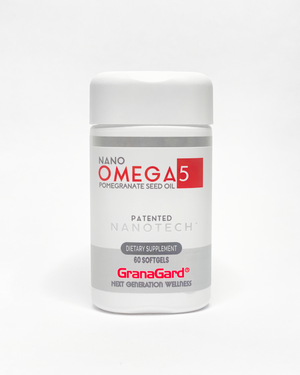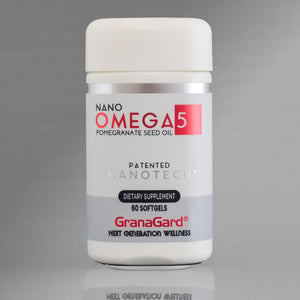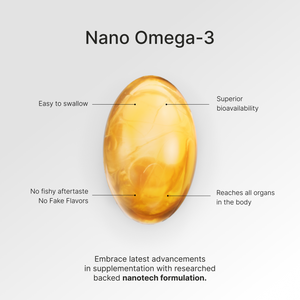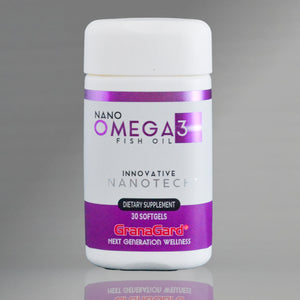Omega-3 fatty acids have multiple beneficial effects on the body. Perhaps the most well-known are in the cardiovascular area, but Omega-3 also has antioxidant and anti-inflammatory properties, helps strengthen the immune system, promotes neurotransmission in our brain... Learn about all the systems and organs it benefits.
What are Omega-3s

What we know as Omega-3s are a family of polyunsaturated fatty acids. A fatty acid is a biological molecule of a lipid (fat) nature that consists of a long, linear hydrocarbon chain (carbons bonded to hydrogens) of varying length or number of carbon atoms, with a carboxyl group (carbon, hydrogen, and oxygen) at one end. The term polyunsaturated means it contains more than one double bond, and a common characteristic is that the first double bond in that molecule is located at the third carbon (hence the name Omega-3). Among them, the most well-known are alpha-linolenic acid (ALA), eicosapentaenoic acid (EPA), and docosahexaenoic acid (DHA). The simplest of them, alpha-linolenic acid (ALA), can be ingested through certain vegetables. Through metabolic reactions (those that occur in our body to process food), our body can convert alpha-linolenic acid (ALA) into other Omega-3s, namely eicosapentaenoic acid (EPA) and subsequently docosahexaenoic acid (DHA), but this only occurs in very small amounts. Therefore, they are required from external sources.
Why Omega-3 is an essential nutrient
There are essential nutrients, meaning our body cannot produce them, and we can only acquire them through diet or supplements. One of the most important among these essential nutrients is Omega-3, a fat that we consume less and less of today, and as we will see, it is crucial for our health. Like many other essential nutrients, we need Omega-3 for numerous processes in our body, and obviously, when we do not have sufficient amounts of Omega-3, we will suffer the consequences in our body.
What are the benefits of Omega-3 for our organs
Omega-3 has anti-inflammatory and antioxidant, (What are antioxidants) properties that explain many of the benefits associated with it. Every year, there is an increase in research on Omega-3. In 2023 alone, there were 2080 scientific publications, and indeed, new benefits are registered daily. As mentioned at the beginning, perhaps the most publicized are those related to the cardiovascular area, (Omega-3 Benefits for Cardiovascular Health) but practically, today, there is no organ or system that does not benefit from Omega-3. Let's see in detail:
- Cardiovascular System: helps improve blood pressure levels, reduces the risk of arrhythmias, and controls the appearance and progression of atherosclerosis.
- Respiratory System: The presence of adequate amounts of Omega-3, especially DHA, improves lung function parameters recorded by spirometry.
- Musculoskeletal System: The anti-inflammatory and antioxidant properties of Omega-3 reduce inflammation and help in the progression of osteoarthritis. Additionally, the presence of Omega-3 improves muscle performance in individuals under training.
- Digestive System: Omega-3 has a beneficial effect on gut flora, promoting healthy digestion and helping to contain toxins and other harmful elements.
- Immune System: strengthens the immune system and aids in defense against viral agents. In the recent COVID-19 epidemic, better outcomes were observed in patients with adequate levels of Omega-3, to the point that many researchers suggested that Omega-3 supplementation should be part of the treatment.
- Nervous System: through its antioxidant properties, it would have a positive effect in preventing neurodegenerative diseases. Omega-3 aids neurogenesis (formation of new neurons) and promotes neurotransmission processes. Omega-3 deficiency has been found in patients with depression.
- Renal System: Omega-3 has been associated with improved albumin levels in patients with chronic kidney disease.
- Endocrine System: In addition to the well-known effects on lipids, Omega-3 has been reported to improve post-meal glucose levels and reduce insulin resistance in diabetes. (Oxidative stress can cause Type 2 diabetes).
- Sensory Organs: Omega-3 has been investigated in ophthalmology with promising results in macular degeneration, diabetic retinopathy, and dry eye.
- Skin: Omega-3 exerts a beneficial action by controlling the inflammation accompanying some dermatological pathologies.
Other benefits: several studies have suggested that Omega-3 reduces the risk of developing some types of cancer, such as breast and colon cancer.
Which foods contain Omega-3

Our body does not produce Omega-3, so it is necessary to obtain it from the diet. (Antioxidant Foods). We find Omega-3 in these sources:
- Fatty fish: salmon, sardines, herring, mackerel, tuna, trout, and anchovies.
- Seeds: chia, flax, hemp, and walnuts.
- Oils: fish oil, flaxseed oil, canola oil, and walnut oil.
- Eggs: especially those from hens fed diets rich in Omega-3.
- Spinach: although in smaller quantities than other sources, spinach contains Omega-3, and its content is enhanced when cooked.
- Krill: small crustaceans rich in Omega-3.
It is important to remember that the amount and type of Omega-3 (EPA, DHA, ALA) vary depending on the food. Therefore, it is beneficial to consume a variety of sources to ensure a complete intake of the different types of Omega-3.
Why Omega-3 supplements are an advantage

It is not always possible to consume a diet rich in Omega-3, and this is why Omega-3 supplements are important and advantageous, as they mainly contain EPA and DHA, which are the hardest to obtain in the daily diet. Not all supplements are the same. Omega-3 is an oil, and as such, it has particular physicochemical characteristics, among them: it can dissolve in other oils but not in water. Previously, we saw that Omega-3 benefits the entire body, but reaching some organs and tissues is more difficult because it must navigate different compositions with a predominance of fat or water. Through nanotechnology (What is Nanotechnology), it has been possible to convert Omega-3 into a nanoemulsion, meaning the oil can now dissolve in water, making it easier to reach all tissues. Additionally, its nanometric dimensions allow it to cross all the body's barriers. It has been proven that the potency of nano-formulated Omega-3 is four times higher than that of conventional Omega-3. This nano-formulated presentation is now available, and its name is Nano Omega-3 by GranaGard®. If you want the benefits and protection of Omega-3, get them with Nano Omega-3 by GranaGard®.





